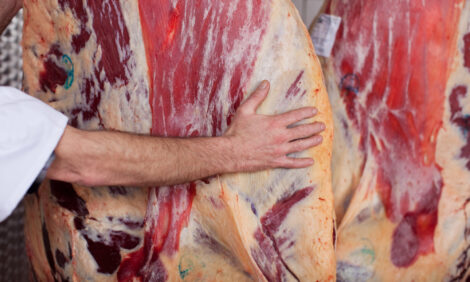



Scottish Farmers Urged to Check Vaccination Status
UK - NFU Scotland is urging all Scottish livestock producers to maintain their vigilance against bringing the devastating livestock disease, bluetongue into the country.That vigilance needs to extend to animals being brought into Scotland from England and Wales and producers are reminded to seek reassurances from sellers south of the Border on the vaccination status of any stock being brought north.
“In terms of herd or flock health, it is always good practice to know the health status of any bought-in animals before introducing then to the rest of your stock. That common-sense approach needs to be extended so those producers bringing stock up from England and Wales know whether or not the animals have been properly vaccinated against bluetongue. The best protection against bluetongue remains the responsible sourcing of livestock.
“We bring around 200,000 head of livestock into Scotland each year from England and Wales and they are an important part of our livestock industry. This is not a demand to end such a trade, simply a call that those who regularly trade in stock from other parts of Great Britain take time to verify the vaccination status of those animals
“While Scotland, in keeping with the rest of Northern Europe, operates a compulsory vaccination programme against bluetongue, vaccination in England and Wales remains voluntary. At Defra’s Bluetongue Stakeholder meeting in March, it was revealed that the uptake of vaccine across England during 2008 was 16 million doses, sufficient for 60 percent of English livestock. However, it is believed that the uptake in southern England is over 90 percent whereas the North of England has an uptake of only 26 percent. Producers bringing in stock to Scotland need to take heed of these figures and ask questions about any animals destined for their farm.
While Scotland’s voluntary import ban is robust, some producers in England and Wales continue to bring in stock from other parts of Europe where two strains – BTV1 and BTV8 – are present. While legal, these imports still pose a risk. Currently, GB only has access to vaccine against BTV8 and is unprotected against BTV1. More than 4000 animals requiring post-movement testing for bluetongue were brought into England and Wales last year. Of that number, more than 60 were found to be carrying the virus. The level of imports into England and Wales is continuing with almost 350 animals requiring post-movement testing in the first two weeks of April.
“That level of risk presented by importation, particularly now that temperatures and midge activity are rising on the Continent, has thankfully been recognised in Scotland as unacceptable. Our livestock farmers deserve great credit for the responsible way they have gone about protecting themselves against this appalling livestock disease. Vaccine uptake in
Scotland is high and likely to well exceed the 80 percent needed for disease control. This will hopefully provide the necessary protection we need against strain 8 of the disease. Similarly, our voluntary import ban continues to hold strong – vital if we are also to keep BTV1 out of the country - with the vast majority of producers forsaking importation from Europe for the benefit of the wider Scottish industry.


